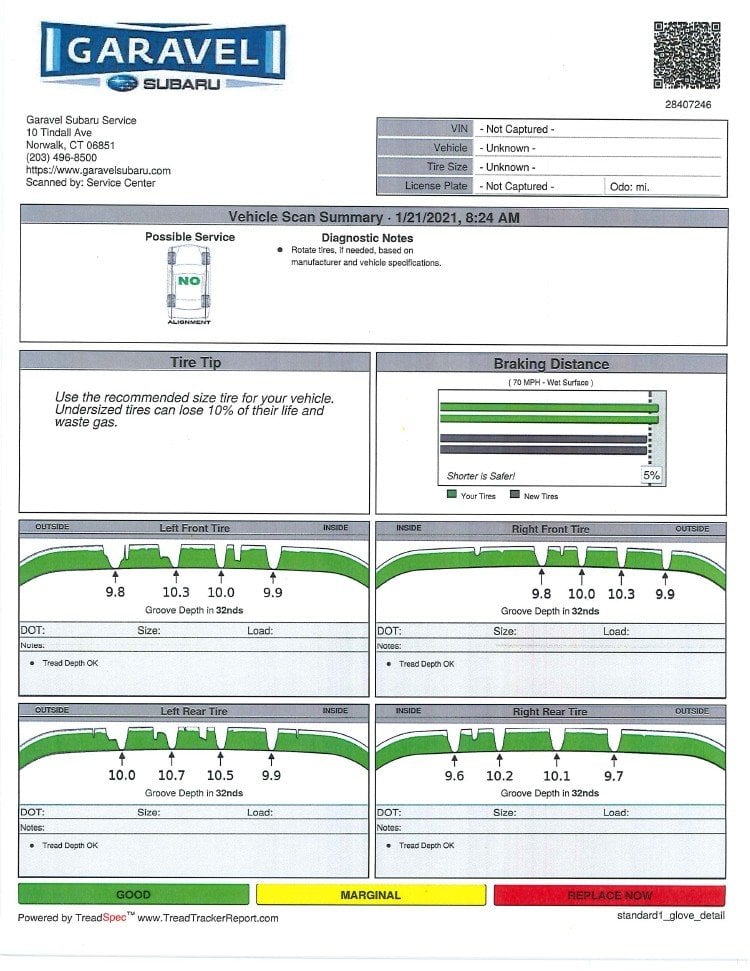
Norwalk's Trusted Local Tire Shop: Our Commitment to Your Satisfaction
Norwalk's trusted local tire shop offers expert tire selection with our Tire Price Promise*. Our Factory Trained Teams provide installation services with competitive pricing that can't be beat, featuring premium brands like BFGoodrich, Bridgestone, Continental, Dunlop, Falken Azenis, Firestone, Goodyear, and Michelin. As fellow members of the Norwalk community, we deliver friendly customer service from start to finish, ensuring lasting quality for miles to come.
Quality tires are a worthwhile investment as they're your first line of defense when encountering less than ideal road conditions. The physical amount of tire that actually contacts the road is relatively small—usually only about the size of your hand—making premium tires essential for safely navigating Norwalk's streets and highways. Beyond safety, tires play a vital role in your vehicle's handling and maneuverability, ensuring your Subaru responds gracefully through traffic and around hazards found throughout Fairfield County.
*If you find a lower advertised price on the same tires, we'll match it. Terms and conditions apply. See dealer for details.
Understanding the Relationship Between Tread Depth and Your Ability to Stop Effectively
One of the most important factors to consider when deciding whether or not to replace your old tires comes in the form of how much tread depth they have left. If you're not familiar, tread depth is the measurement from the top of your tire's rubber to the bottom of its deepest grooves and is a strong indicator of your ability to generate traction while on the roads of Norwalk.
New
Replacement Not Necessary
Deep grooves allow water to flow easily from between youre tires and the road to resist hydroplaning. Block edges and treat siping bite into snow to promote wintertime traction.
Tire treat depths typically begin with 9/32" to 12/32"

Wearing
Replacement Upcoming
Dry road responsiveness is enhances as treads wear, but traction on very wet roads and deep snow is reduced
Make sure your tires' tread depths are sufficent for road and weather conditions

Worn Out
Replacement Recommended Immediately
Low tread depth restricts water, slush, and snow from escaping from between tread and road. This will promote hydroplaning and reduce traction on wet and wintry roads.
Minimum tread depth recommended: Snow - 5/32" | Rain - 4/32" | Dry - 2/32"

As this tread wears down over time, your tires become less effective at gripping the road. This, in turn, makes stopping abruptly and efficiently much harder. Considering how essential having confidence in your stopping power is during your daily commute, next trip across the country, and everywhere in between, having any doubts caused by worn tires is definitely not optimal.
Frequently Asked Questions Regarding New Tires
Q: Are winter tires necessary if my car has all-wheel drive?
A: All-wheel drive is definitely a great feature to have when facing inclement or harsh winter weather on the roads of Norwalk. However, it is really just one factor that goes into this equation. Your tires are still your only point of contact with the road, so ensuring that they are well-suited for this job is vital to promoting increased traction and confident stopping power.
Q: Is it really worthwhile to own two different sets of tires?
A: Yes. The benefits that come with being able to switch back and forth between winter tires and summer/performance tires easily dwarf the upfront costs of owning two unique sets of tires. Seasoned drivers here in Norwalk understand this, which is why so many keep a set of winter tires as a way to both better manage winter driving conditions and increase the useful life of their all-season or summer/performance tires by limiting the miles traveled on these tires.
Q: Can I drive on my winter tires throughout the entire year?
A: Since the soft rubber compound employed by this type of tire doesn't do well in warmer months, this is generally not seen as a smart call. The best way to save money and avoid limiting the useful life of this investment is by installing tires that are appropriate throughout the year that match up to the current season or driving conditions.
Q: What is a four-wheel alignment?
A: A four-wheel alignment is a service that leverages the power of precision lasers and sensors to calibrate – and correct – the angles of the wheels on your car. This practice is a great way to extend the useful life of your tires, protect your vehicle, and correct any vibrations you may have noticed while driving to work or dropping the kids off at school.
Q: My tire pressure monitoring system (TPMS) light just came on. What do I do now?
A: The TPMS light only comes on to indicate that low pressure has been detected in one or more of your tires. This can sometimes happen due to changes in weather and fluctuations in the internal pressure of your tires. However, you can never go wrong with bringing your vehicle in for us to inspect it when this warning signal catches your attention.
Enjoy the Benefits That Come with New Tires Today
After covering all of this info, odds are that you are ready to stop by and equip your vehicle with a great new set of tires that is perfectly suited to match your daily commute here in Norwalk or next trip down to the historic South Norwalk (SoNo) neighborhood, the Lockwood-Mathews Mansion Museum, or even the Maritime Aquarium. To get started on this process, feel free to give us a ring at 203-840-1750 when you have a few free minutes to talk. Doing so is the best way to get connected with our team and ensure that you find the right set of tires for your car, truck, or sport utility vehicle (SUV).





